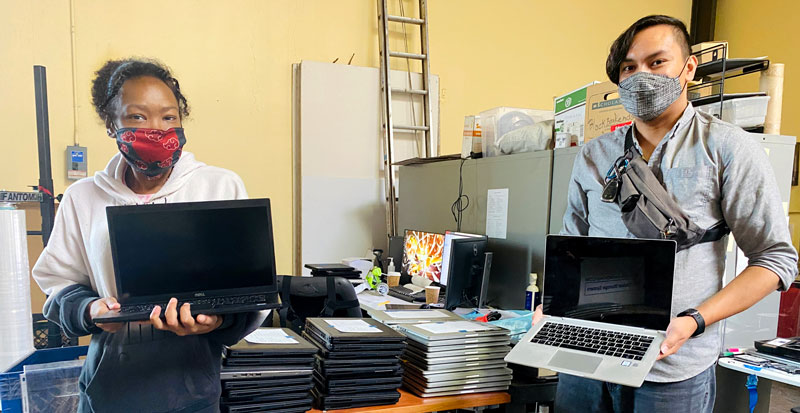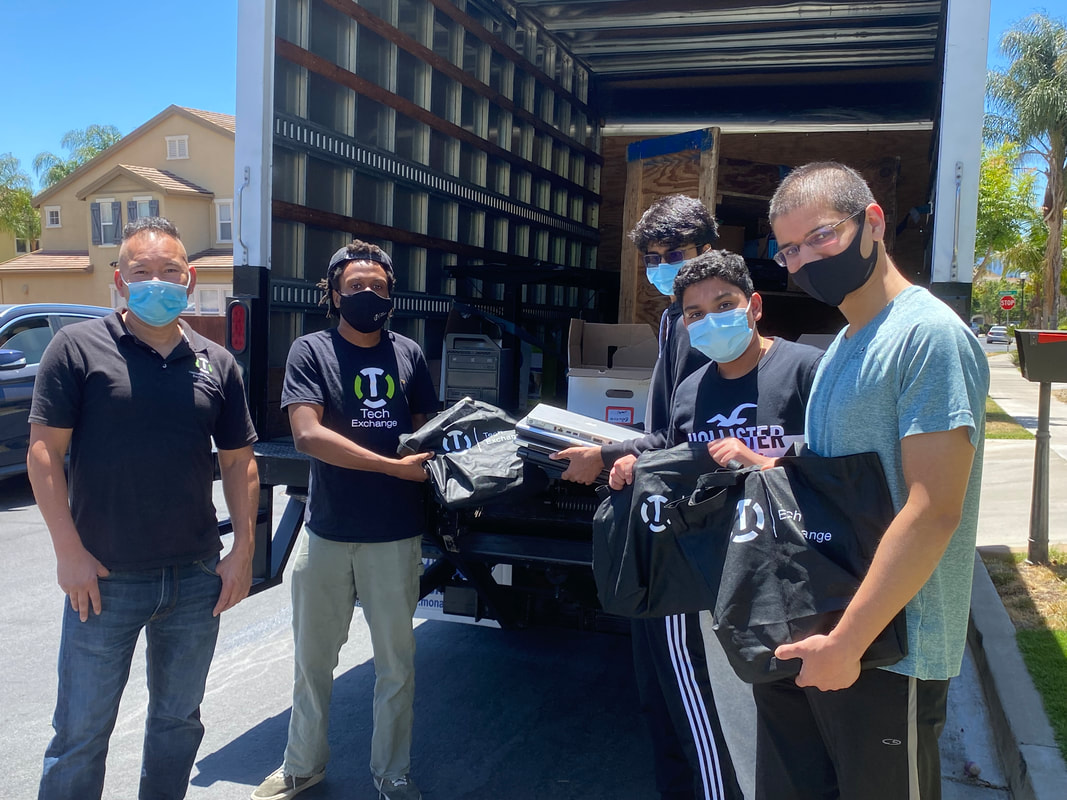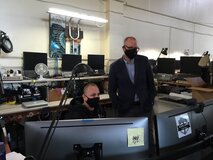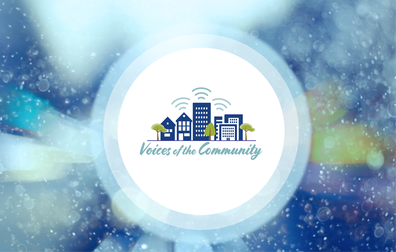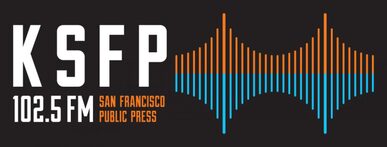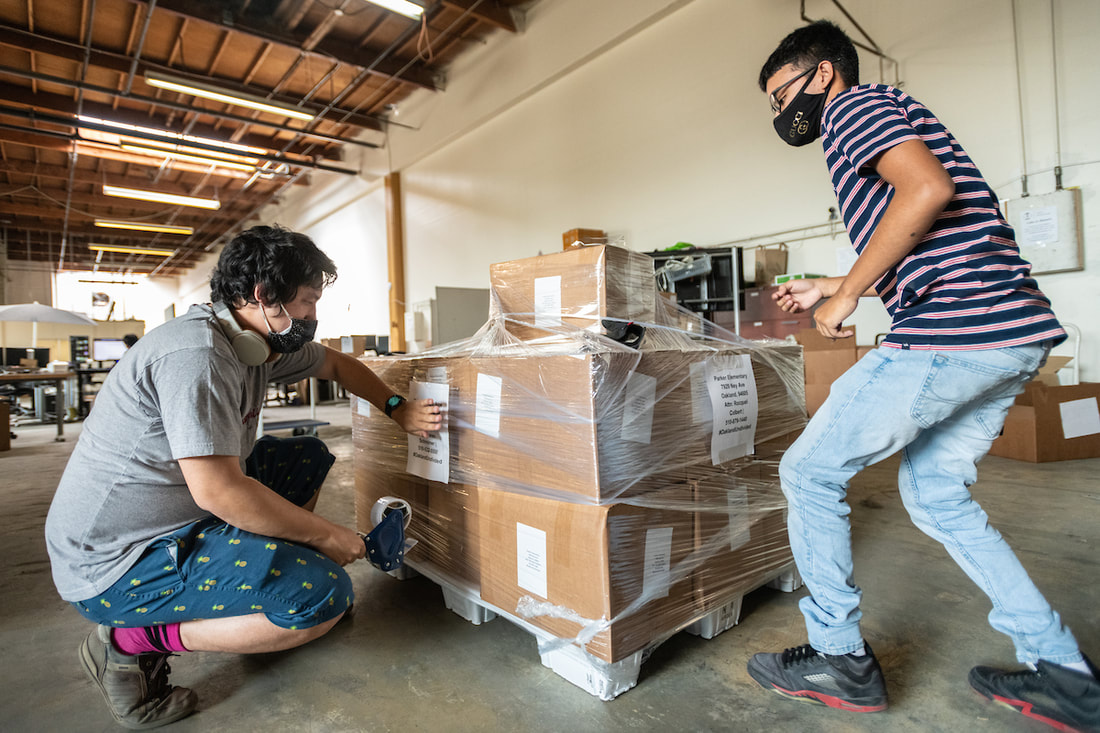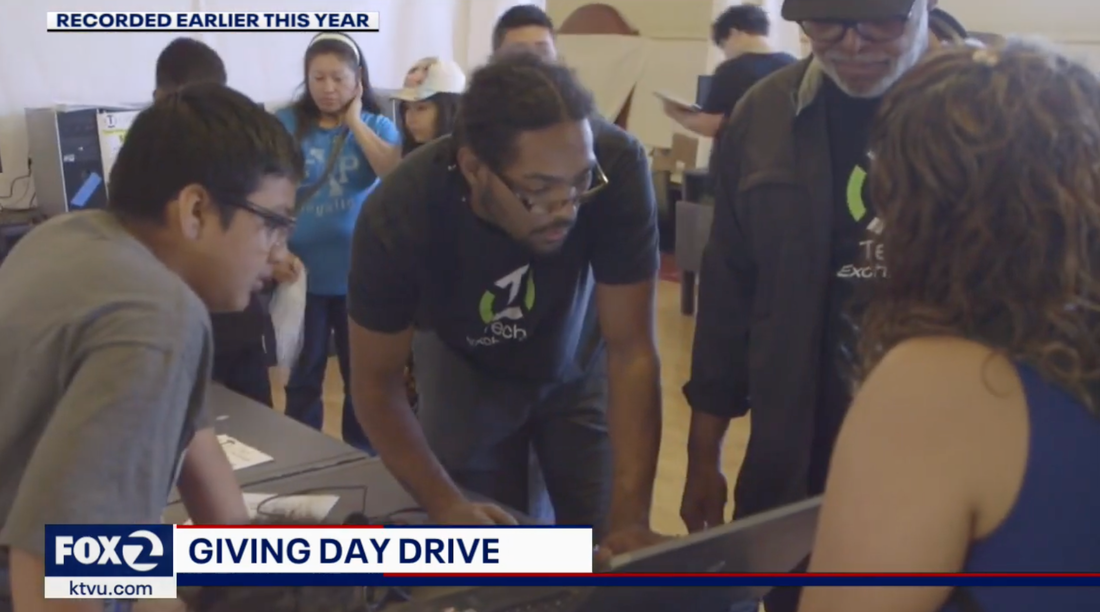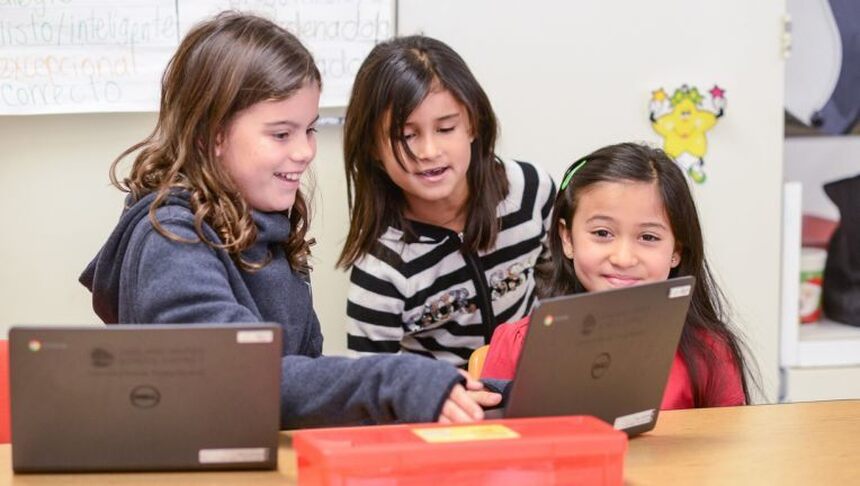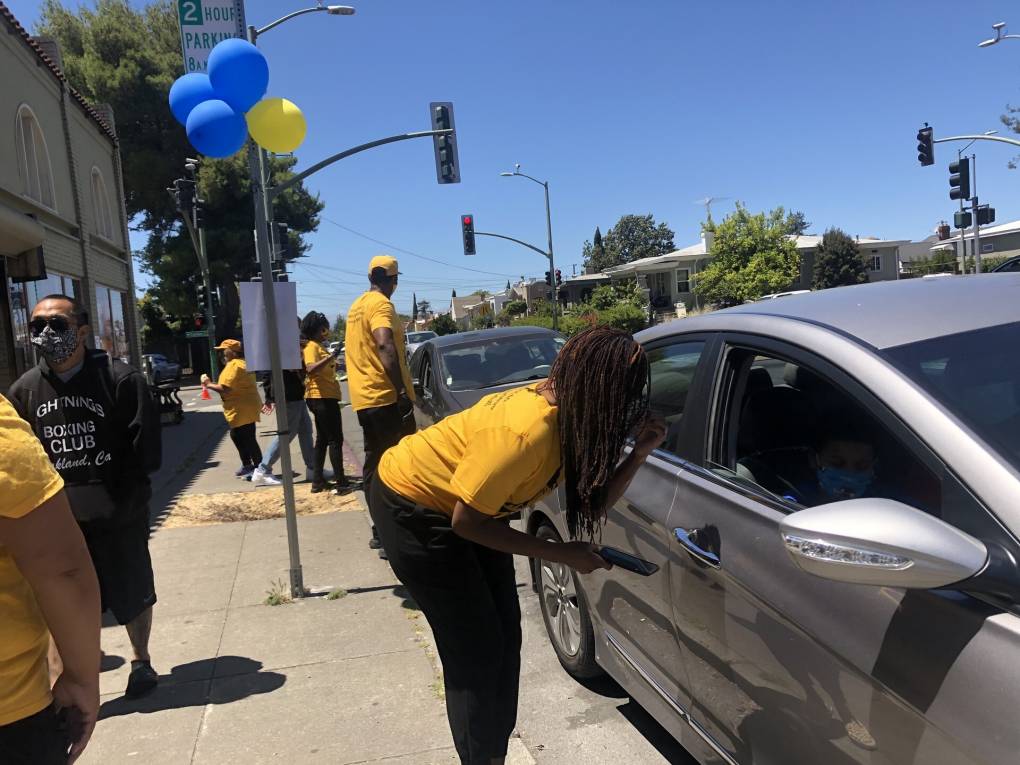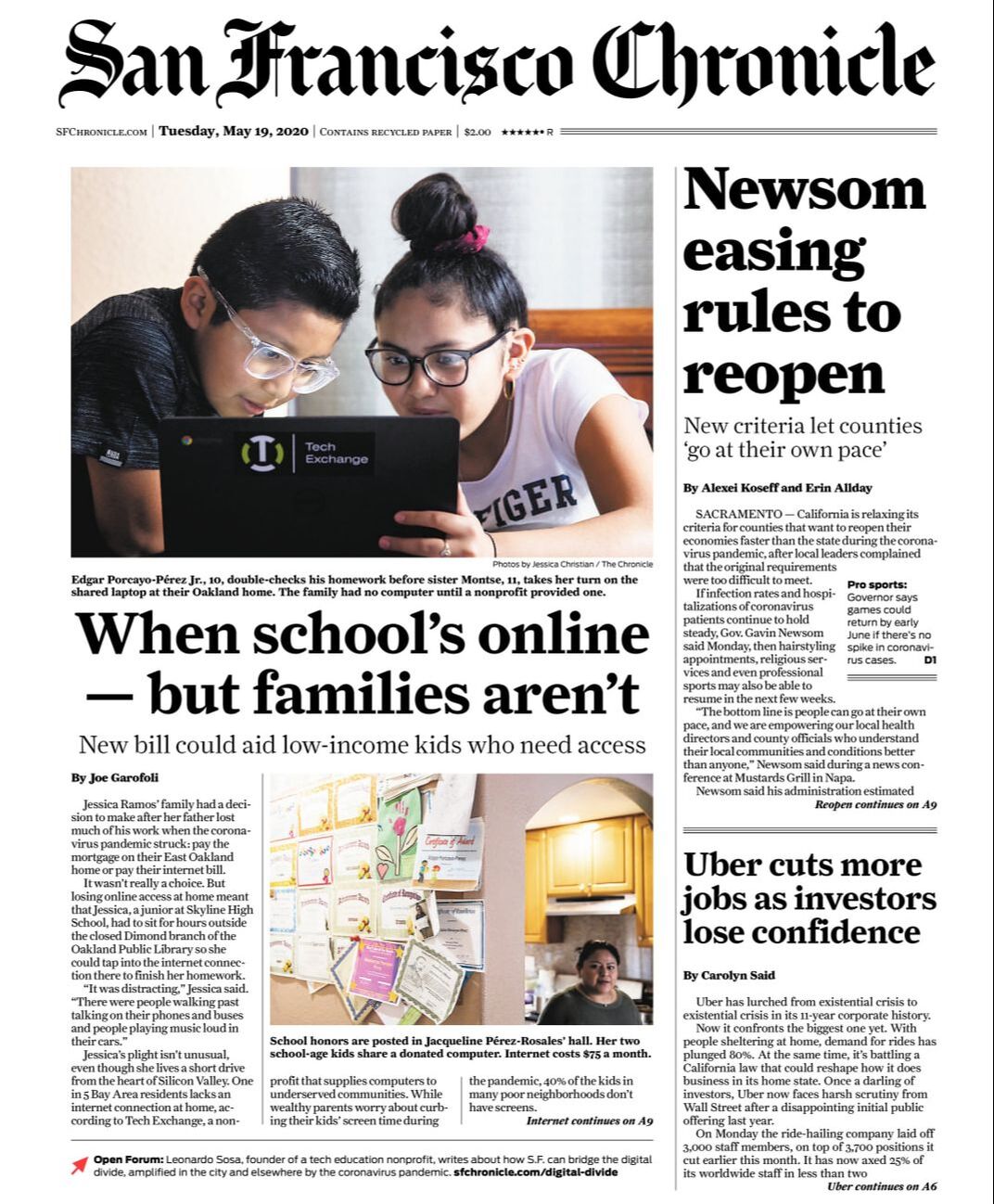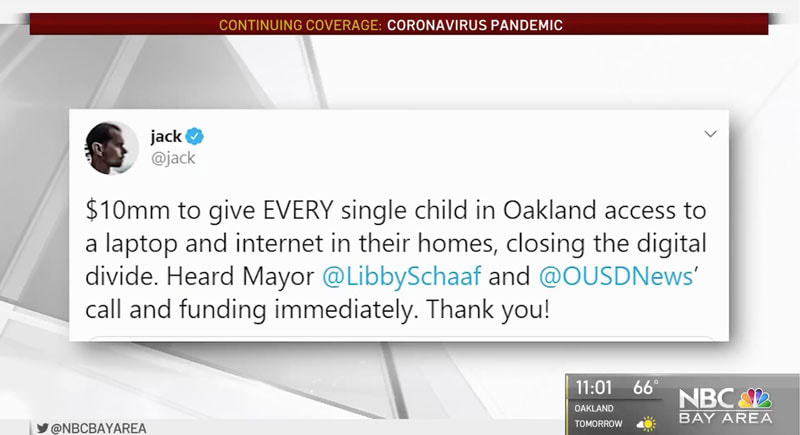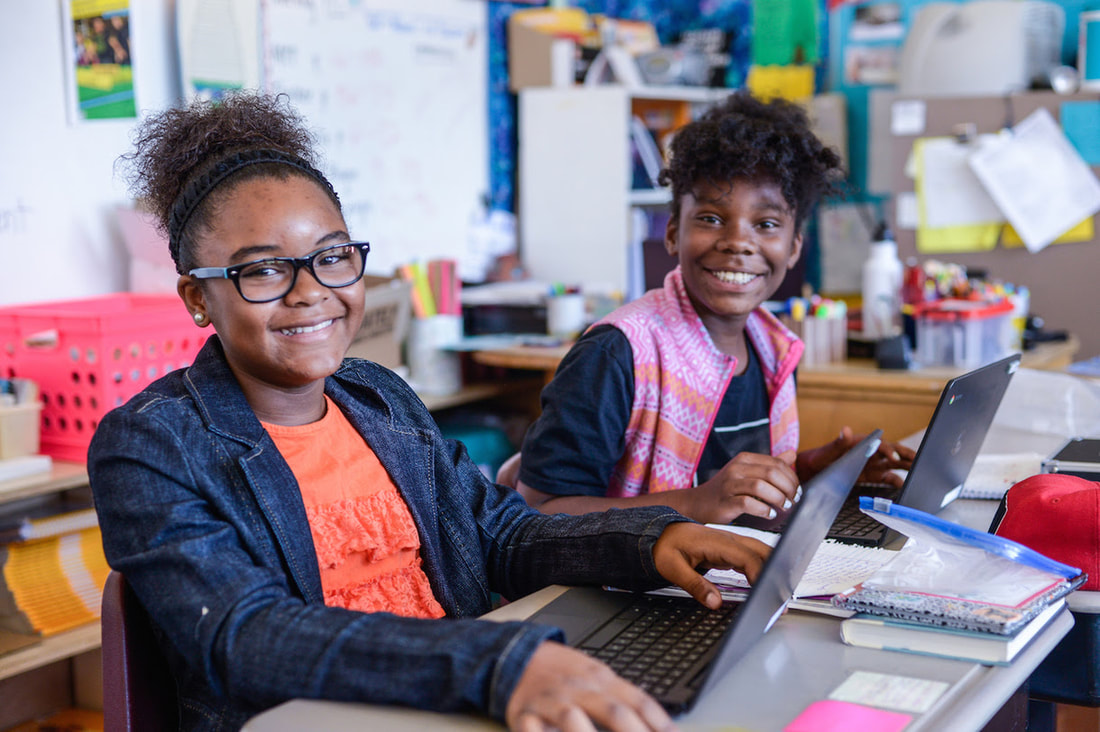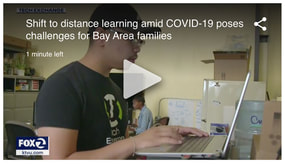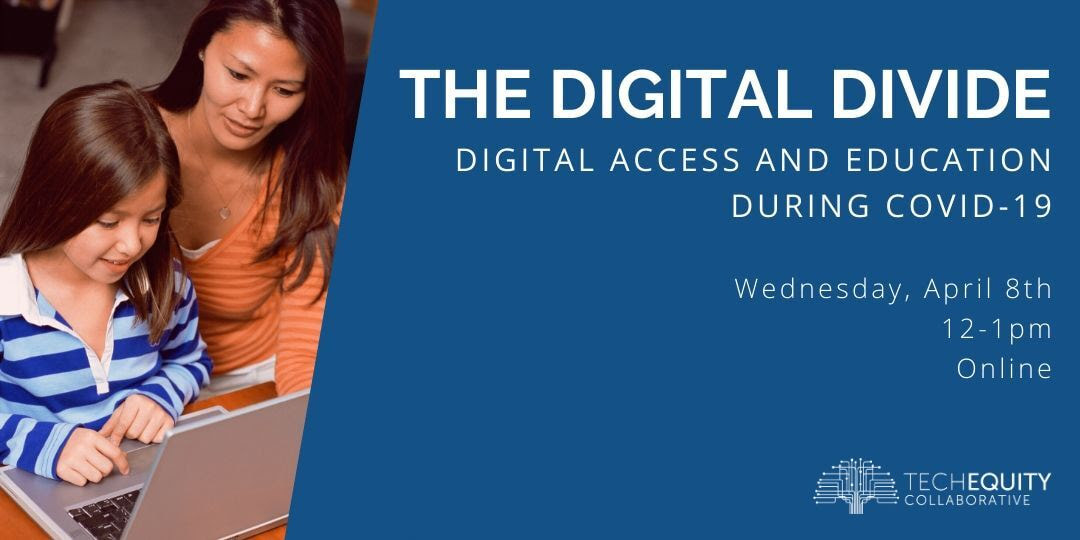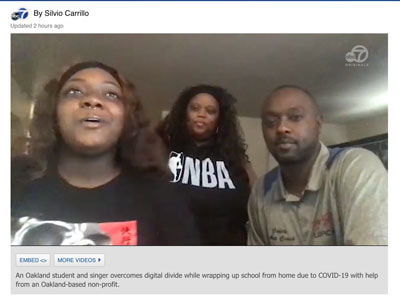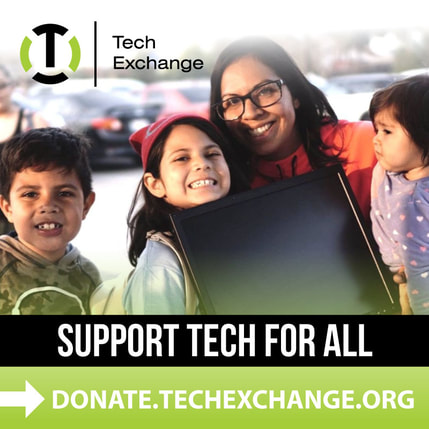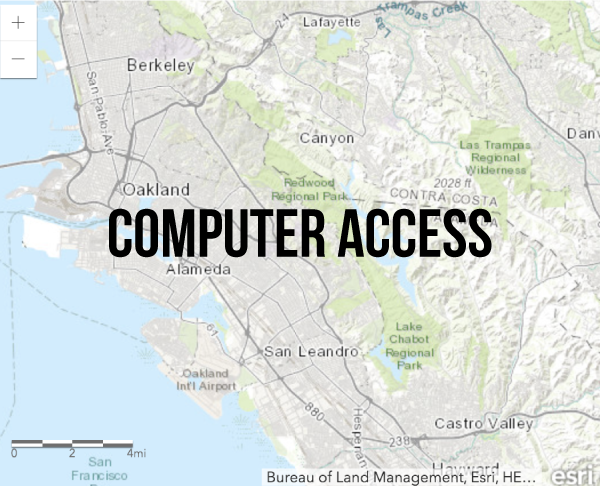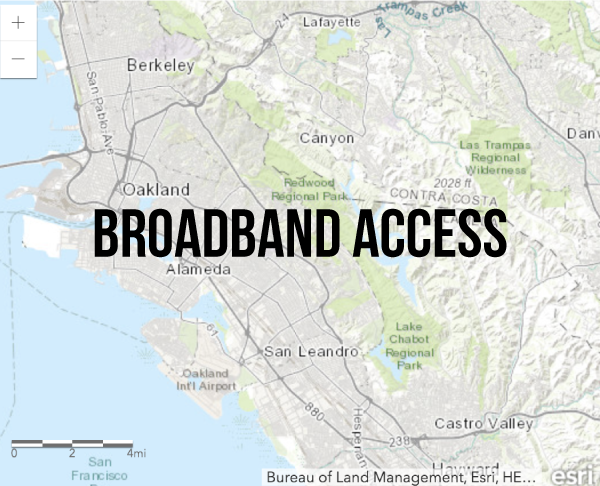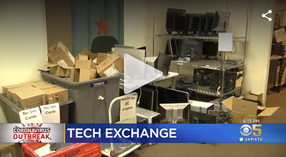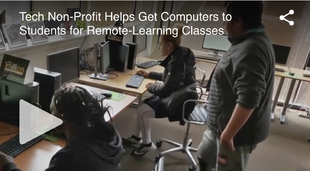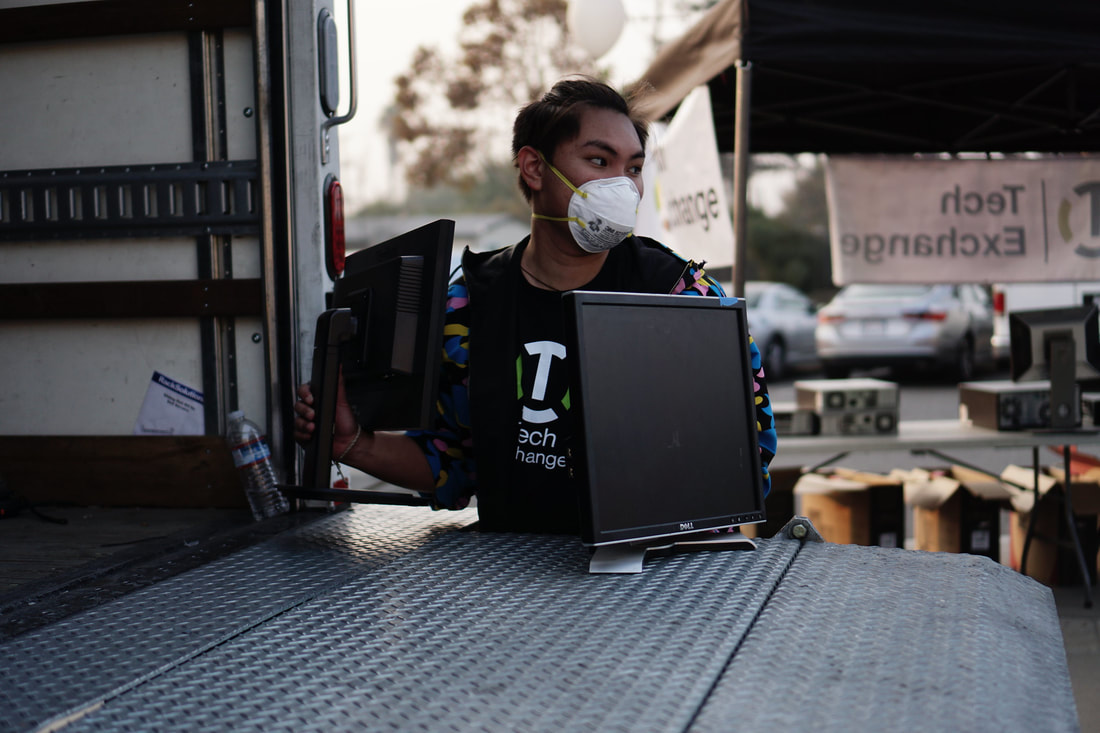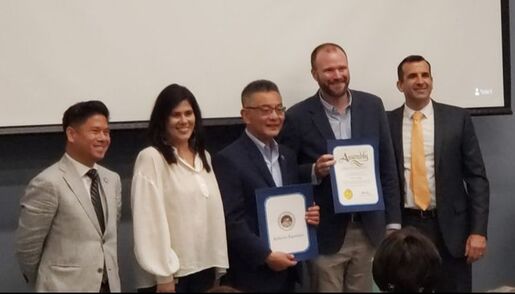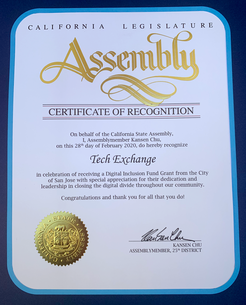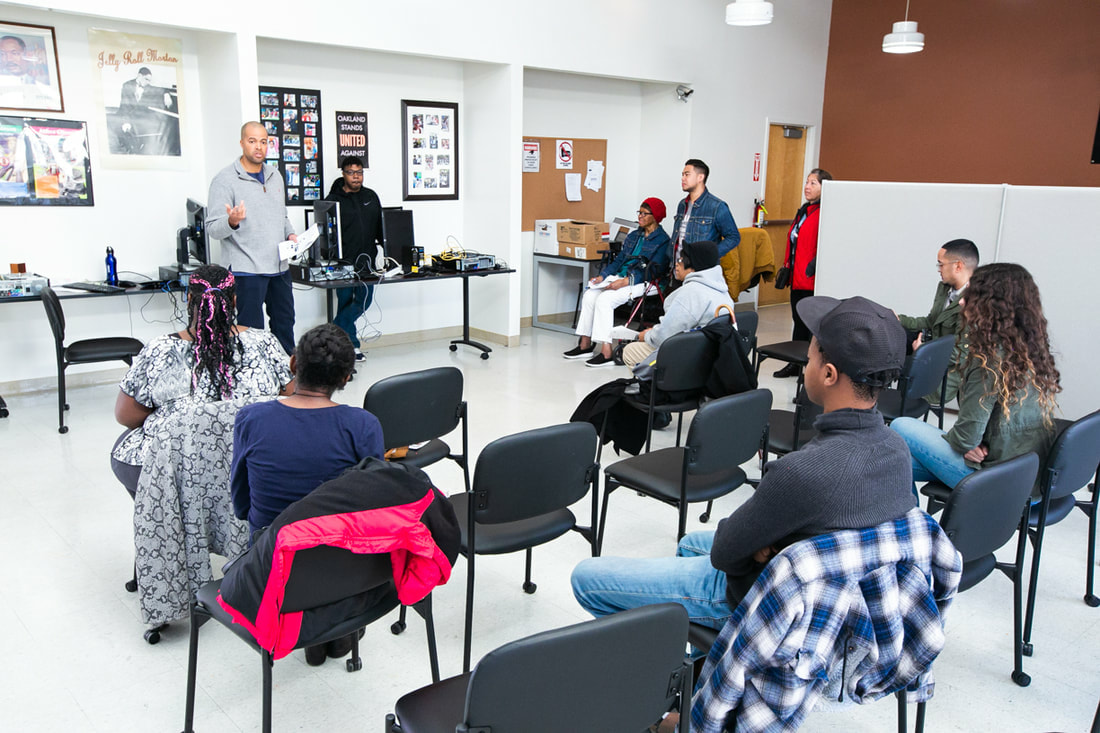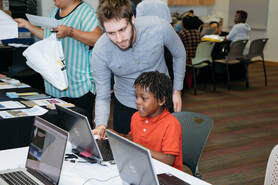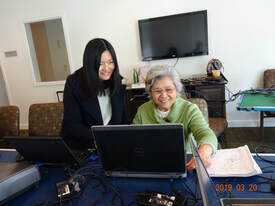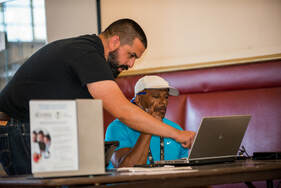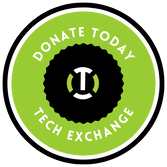|
For Media Inquiries : Please send us an email to [email protected].
To Support Tech Exchange: Donate.Techexchange.org Questions: Email [email protected]
0 Comments
Oakland, CA — Tech Exchange is thrilled to announce the addition of Ashley Pablo to our team as a Data and System Administrator Assistant . Ashley’s journey with Tech Exchange began through the Success Center's Workforce Development Program, where she successfully completed 500 hours of training and hands-on experience.
Ashley, a recent graduate from California State University, Los Angeles and Oakland Native, with a Bachelor's degree in Computer Science, exemplifies the spirit of dedication and perseverance. Her commitment to personal and professional growth is highlighted by her achievement of the Salesforce Administrator Certification in February 2024. During her time with the Success Center, Ashley showcased her exceptional skills and dedication to learning. The comprehensive training provided her with a robust foundation in data and system management, which perfectly aligns with Tech Exchange’s mission to bridge the digital divide through sustainable and eco-friendly practices. "We are delighted to welcome Ashley to the Tech Exchange family," said Samuel Aristondo, Director of Partnerships and Community Engagements at Tech Exchange. "Her expertise in data and systems management, coupled with her enthusiasm and fresh perspective, will be invaluable to our team as we continue to expand our impact in the community." Ashley’s role at Tech Exchange involves supporting our systems and data management, ensuring the smooth operation of our technological infrastructure. Her responsibilities include managing databases, optimizing system processes, and contributing to the overall efficiency of our operations. "I'm excited to be part of an organization that makes such a positive impact in the community," said Ashley. "Tech Exchange's commitment to digital equity and sustainability aligns with my values, and I'm eager to contribute to their mission." Tech Exchange has been dedicated to providing digital equity to Bay Area residents since 1995. By employing a sustainable, eco-friendly model of refurbishing donated computers and providing them to families, schools, and community organizations, we strive to bridge the digital divide. Our programs, including computer training and tech support, empower individuals and communities with the tools they need to succeed in the digital age. Ashley’s journey from the Success Center to Tech Exchange is a testament to the power of workforce development programs in nurturing new talent and creating opportunities for career advancement. We are confident that Ashley will make significant contributions to our organization and look forward to witnessing her growth and success. About Tech Exchange: Tech Exchange is a nonprofit organization dedicated to providing digital equity to Bay Area residents since 1995. By refurbishing donated computers and providing them to families, schools, and community organizations, we promote sustainable practices and empower individuals with access to technology and digital literacy. About Success Center: The Success Center’s Workforce Development Program provides training and employment opportunities to individuals, equipping them with the skills needed to succeed in today’s job market. Through comprehensive programs and partnerships, Success Center empowers individuals to achieve their career goals. 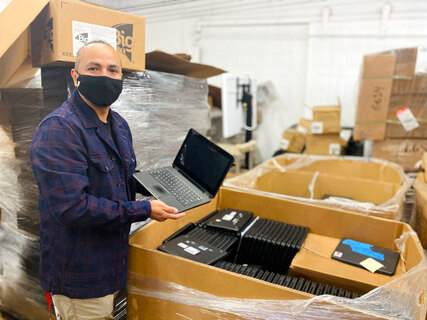 When the Chief Technology Officer for West Contra Costa Unified School District, Tracey Logan, confirmed that thousands of student laptops were due to be replaced by new computers, she saw an opportunity to advance digital equity. Having previously referred an equipment donation from another organization, she knew how efficiently Tech Exchange’s warehouse team accepts, sorts, and refurbishes computers for the community. After reaching out to Executive Director Seth Hubbert, a resolution was created and sent to the WCCUSD Board of Directors. We are thrilled and grateful to announce that on August 25, 2021, the resolution was approved! Tech Exchange has already received the first batch of equipment. The 12,000 Lenovo N23/N24 laptops from WCCUSD are deemed “enterprise end-of-life” — but after our staff evaluates and upgrades them, the computers will become an important part of Tech Exchange’s efforts to close the digital divide. In operation for over 25 years, Tech Exchange’s computer refurbishment process is a well-oiled machine. After our drivers pick up the donated devices and bring them to our warehouse, equipment is sorted, tested and data wiped. Usable devices are put into production where we load an operating system and additional software to bring them up-to-date and cloud-ready prior to sending them to clients and families through our programs. Any devices that are not salvageable are responsibly recycled through our program partner Civic Corps. This equipment donation from WCCUSD will allow Tech Exchange to connect thousands of students and families with a free laptop with a one-year warranty. Tech Exchange also provides free ongoing tech support at our Tech Hub or through our call center, along with digital skills training and guidance in signing up for affordable internet. We appreciate all the supporters who make our work possible, and extend our special thanks to Tracey Logan and the Board of Directors at West Contra Costa County Unified School District for this remarkable gift. 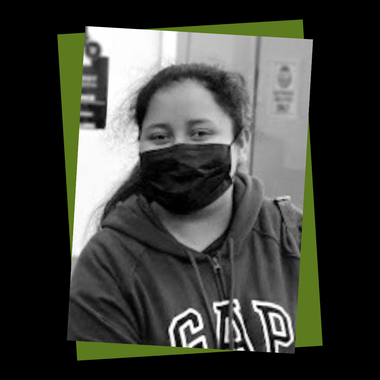 Fabiola, Tech Exchange Intern Fabiola, Tech Exchange Intern Fabiola, Summer Intern Meet Fabiola, a 10th-grader at Fremont. Fabiola learned about Tech Exchange after receiving a computer and hotspot through the #OaklandUndivided campaign and then again while attending a summer internship fair. She joined our team this summer as Tech Hub intern, where she was able to apply her interest in fixing computers and build upon her technical skills. Check out our blog to learn more about her experience. What have you enjoyed most about working with Tech Exchange? Honestly since we were in the pandemic I did not socialize a lot with people, at Tech Exchange it is a fast paced environment so I was able to talk to a lot of families and fellow school peers to help them with tech support. Given the circumstances of the pandemic this helped me get outside the house and meet new people which was very satisfying. In what ways did you feel supported by staff at Tech Exchange? If I need anything, the staff at Tech Exchange gave me a proper answer. If I did not know something they were more willing to help out which was really helpful and I felt supported. What have you learned from working at Tech Exchange? I have learned a lot of technical skills, I learned safety protocols while working with computers which is really important. I learned how to image a computer, install software into computers, and learned the hardware components of a computer. What were the most important skills you gained at Tech Exchange? I learned how to keep my stuff organized, being mindful of what goes where and what is safe and what isn't. I also learned how to interact with families and fellow student-peers more efficiently. What is a favorite memory you’d like to share about working at Tech Exchange? There wasn't a specific favorite memory of working with Tech Exchange, I enjoyed coming in every shift and looking forward to what we were going to do that day. I enjoyed being with the staff and learning new skills. How has Tech Exchange helped prepare you for your next step? It gave me hands-on experience, now if my family or friends need help they can come to me for tech support. If I go further in the tech field I know this experience will be very helpful. What advice would you give to someone considering an internship with Tech Exchange? I would suggest for someone considering an internship with Tech Exchange to ask questions if you do not know something. Staff will help you out. Evergreen High School Students (RIGHT TO LEFT): Ayush Agarwal, Nitin Jaladanki, and Anish Thalamati deliver devices to Tech Exchange to refurbish. San José Teens Offering Free Python Coding Classes in the Community San José, CA — High school students Anish Thalamati and Ankit Kapoor, co-founders of the nonprofit Closing the Divide, have teamed up with Oakland-based nonprofit Tech Exchange to narrow the digital divide for students across the San José Bay Area.
What started as an Evergreen Valley High School class assignment completed by two eleventh-grade STEM students has grown into a nonprofit, Closing the Divide (CTD). “After learning about the issue of the digital divide in my computer science principles class, I began to realize the inequity in terms of access to technology--even in high tech areas, such as Silicon Valley,'' says Anish Thalamati. The two students “set up initiatives for low-income households in an attempt to decrease the digital divide.” The young men also took coding classes through Evergreen Valley College in San José. “Our passion for coding was fostered by our surrounding environment's reliance on technology; specifically, software development,” says the CTD team. Closing the Divide is offering free coding classes to the community this summer, June 19 - July 17, 2021. Classes are offered as a 4-week long Python Bootcamp with 2-hour classes every Saturday for anyone regardless of area of residence. In addition, CTD has donated 30 decommissioned computers to Tech Exchange to be refurbished for others. “Both my friend Ankit and I share this passion. By founding this organization, we hope to help others gain access to the technology and skills to pursue the same passion we have for computer science,” says Thalamati. Tech Exchange is supporting CTD by donating 10 refurbished laptops to the organization to distribute to their students in need. The high-end devices are suitable for coding, and were initially donated to Tech Exchange by Intuitive Surgical. Tech Exchange’s activities in San José and South Bay are supported in part by generous funding by the San José Digital Inclusion Project and the Jewish Community Federation and Endowment Fund. To learn more about Tech Exchange and Closing the Divide, visit www.techexhange.org and https://closingthedivide.foundation/
Jefferson Awards for Public Service
OAKLAND (KPIX 5) — An Oakland man leading a technology nonprofit had a big part in helping close the digital divide among the city’s students during the pandemic switch to virtual learning.
Oakland Technology Exchange refurbishes used computers to give away at free to low cost to underserved folks who can’t afford desktops, laptops or tablets. Executive director Seth Hubbert grew the nonprofit in six years from serving fewer than 1,000 Oakland families to 34,000 families in the Bay Area last year. “Living in the Bay Area, heart of technology for the world, this should not be an issue that underserved community struggles with,” Hubbert said of the digital divide. “When the pandemic started, less than 25 percent of families in Oakland had all the tools, the number of Chromebooks for the number of students, the internet access they needed,” Hubbert said. Today, he said, 98 percent have what they need. “I’m thrilled, excited, but I don’t want to lose the potential of sustaining this,” said Hubbert. He and his team closed the huge gap through Oakland Undivided, a partnership with the city, Oakland Education Fund and Oakland Promise. With $13 million dollars in funding – $10 million of that from Twitter CEO Jack Dorsey — the program connected folks to the internet and distributed more than 28,000 computers, thousands of them refurbished by Oakland Technology Exchange. Alicia Huerta brought home a free computer years ago. She and her son Juan recently got a free tablet. “Tablets and computers can get very, very expensive, especially when you have three kids at home doing online learning,” Huerta said. “If we’re sharing one, it’s going to be hard for us to share and if we have multiples, it’s going to be easier,” Juan added. The 26-year-old nonprofit, which used to be known as OTX West, also offers free tech support. It’s answered more than 10,000 requests for help last year by text, email, phone, or at its store on International Boulevard at 24th Street. Technician Marquece Whitley, a former intern, says Hubbert’s leadership makes all the difference. “Every time I see him I get a smile on my face,” Whitley said. “He’s one of the reasons why I come to work every day, ’cause he makes me feel like I’m part of the team.” Because of the pandemic, corporate donations dropped 60 percent last year. Hubbert is looking for more corporations to donate their used computers when they purchase new ones. The nonprofit is also getting ready to resume computer training sessions at public housing complexes.
COVID-19's IMPACT ON NONPROFITS AND SMALL BUSINESSES
Episode 25: Tech Exchange
Listen in as Tech Exchange Executive Director Seth Hubbert discusses how the work of Tech Exchange has pivoted and deepened to support our community amidst the ongoing impacts of COVID-19.
Stay updated on future episodes by subscribing to Voices of the Community on Apple Podcast, Spotify, and Google Podcasts, or where ever you listen to your podcasts
Photo © 2020 Hasain Rasheed Photography Our warehouse team has been busy prepping the 25,000 #OaklandUndivided Chromebooks to be distributed to Oakland public school students. Thanks to the support of our #OaklandUndivided partners and donors, we’re on track to reach our goal by the end of September of providing ALL qualifying students who have completed the #TechCheck survey with Chromebooks and/or hotspots to keep. The first major #OaklandUndivided distribution event took place on Monday, August 17, 2020 at the shared campus of Futures Elementary, Community United Elementary School and Coliseum College Prep Academy. Ongoing device distribution will continue to school sites with high completion rates of the Tech Check Survey. The #OaklandUndivided Campaign is a collaboration between Oakland Unified School District, the City of Oakland and Mayor Libby Schaaf, the Oakland Public Education Fund, Oakland Promise, and Tech Exchange. The goal of #OaklandUndivided is to ensure that every student in District-run and charter schools is equipped with technology at home to support online learning. Within days of the campaign launch, #OaklandUndivided raised $12.5 million from Twitter and Square CEO, Jack Dorsey and Zynga founder, Mark Pincus, among others. The #OaklandUndivided Tech Check ✔ is live! All Oakland public school families are encouraged to complete the Tech Check survey online or with support from school site staff. SUPPORT TECH FOR ALL Tech Exchange staff and volunteers have mobilized to establish texting and phone banks, responding to calls to inform families of internet options, and preparing hotspots and laptops to be distributed to students.
KTVU's Giving Day Drive recognizes Tech Exchange, an organization that provides free refurbished computers and technology to low-income families. Hear from Executive Director Seth Hubbert about how the need for their service has grown during the pandemic. Tech Exchange staff and volunteers have mobilized to establish texting and phone banks, responding to calls to inform families of internet options, and preparing hotspots and laptops to be distributed to students.
You can help support this critical work by making a contribution to our TECH FOR ALL campaign:
By Lisa Fernandez | KTVU FOX 2 OAKLAND, Calif. - With $12.5 million in Twitter and other tech donations, the Oakland Unified School District announced that 25,000 Chromebooks should make it into the hands of students in late August, weeks after school starts. In a news release, OUSD said the order is still on track for delivery within the first two weeks in August, but students won't be able to get them until later in the month. School is set to start on Aug. 10. Because of coronavirus, schools in at least half of the state that are on a watchlist must resume classes online, not in person. Oakland is one of those school districts, which also has one of the biggest digital divides in the region between students who own computers and have access to WiFi, and those who do not. "While we cannot get the new computers into the hands of students in time for the start of the school year, in the spring, OUSD distributed 18,000 school-based computers to students on loan," the district said. "While it was not enough, it did provide access for most students in need as we were thrust into distance learning." OUSD students will continue to use those computers until those who qualify can get a new Chromebook. OUSD has bought 5,000 temporary devices as additional “loaners.” Most of the new devices are expected to be distributed in late August and September, with students returning loaned devices upon receiving the new laptops, bought with donations from Twitter CEO Jack Dorsey and Zynga founder Mark Pincus. District officials also said that they have been in negotiations with various internet providers to purchase uncapped internet plans, with no data limits, to ensure that students who currently have no internet access at home can access distance learning. At a meeting this summer, administrators said that about half the students don't have proper WiFi setups at home. To make sure that no one falls behind, all families with a student attending an Oakland public school will be asked to complete a Tech Check survey to provide updated information on students’ access to technology at home. If families don't have the internet at home, the district said it will provide alternate methods for completing the survey, such as on paper, and in person. The district asks that families who are able to buy Chromebooks to purchase them now, so if the schools fall short at the beginning of the school year, the district can dedicate its loaner inventory to students with higher needs. Students in other districts in California have tech needs, too. State Superintendent Tony Thurmond said Wednesday said that his department has already begun dispersing the $5.3 billion from the governor's office to local school districts, encouraging them to spend the money on technology. To date, Thurmond said that 700,000 public school students still don't have computers and 300,000 don't have proper hot spots -- situations that could be theoretically remedied with some of that state money. IF YOU'RE INTERESTED: Learn more about #OaklandUndivided at www.oaklandedfund.org/digitaldivide If you want to donate a computer or hotspot, contact [email protected]. If you want to make a donation or discuss a potential financial contribution, contact: David Silver, Mayor’s Office of Education at [email protected]; Jonathan Osler, Oakland Public Education Fund at [email protected] or Curtiss Sarikey, Oakland Unified School District at [email protected]. By Julia McEvoy | KQED Oakland Reach organizers in East Oakland last month handing out laptops and other summer school supplies to the families of Oakland Unified School District students. (Vanessa Rancaño/KQED) Thousands of students across California who still don’t have access to computing devices and reliable high-speed internet remain at serious risk of being left at the starting gate, as most schools prepare to begin the academic year online in less than a month.
The stubbornly persistent digital divide — separating those with access to the internet and computers from those without — has been overtly highlighted by the COVID-19 pandemic as a serious education equity issue. And it remains a formidable hurdle to the successful relaunch of distance learning in many urban and rural school districts. Oakland Unified officials pledged to overcome that divide after last spring's inconsistent and often problematic efforts. Some 3,400 students were found to have little or no digital connection, with many others left trying to do assignments on their smartphones or sometimes forced to break shelter-in place rules in order to find internet access elsewhere. In May, when Oakland city leaders launched a campaign to raise $12.5 million to ensure that every student who needed it would have laptops and internet hotspots, Twitter CEO Jack Dorsey responded with a whopping $10 million donation, inspiring other donors. In total, the city and school district raised $13 million, and is now working on a short timeline to secure computers and internet connections for every child in the district who needs them, all before school starts on Aug. 10. “As you can imagine, supply chains are challenging right now,” said David Silver, director of education for Oakland Mayor Libby Schaaf, who helped seal the deal with Dorsey. “So we do not have the computers yet, but they are on the way. And our goal is to make sure that we get those to kids and families as soon as possible.” Silver said Dorsey’s gift will ensure every child has an internet connection, a computer and the tech support they need. “It's not just about a child getting a device, but it's also how do you make sure if you have a problem, how do you actually troubleshoot that?” he said. So far, the district has spent $5.5 million of the funding on ordering 25,000 Chromebooks. Another $3.8 million is being spent on wireless hotspots, one for each student in a family, to ensure high-speed connectivity for streaming video instruction, according to OUSD Chief of Staff Curtiss Sarikey. “If there are three children, each would have a hotspot just to ensure that there won't be any issues with multiple lines slowing it down to the point kids can't track video,” said Sarikey, adding that the district tested various products and consulted with teachers on the purchase. “We heard a lot from teachers that they spent a lot of time doing tech support during shelter in place, helping kids troubleshoot things that were coming up,” Sarikey said. He added that the district will also provide high-speed broadband to some families at a subsidized rate. At a recent board meeting, OUSD Superintendent Kyla Johnson-Trammell said thousands of students still don't have the digital connections they need. Seth Hubbert, executive director of Tech Exchange, an Oakland-based nonprofit working with the district, doesn’t expect those computers and other devices to be delivered until early August. That's when his team will be tasked with entering all the equipment through a data system developed for the district by Salesforce, and then deliver them to school sites where students can pick them up. “We anticipate about 110 pallets worth of computers, in batches of 1,000, so it's going to be just an awesome visual,” Hubbert said. In preparation, Tech Exchange has leased extra warehouse space and hired temporary staff to help process the computers quickly, while adhering to COVID-19 social distancing protocols. To fill the gap, OUSD distributed some 18,000 district-owned computers to students throughout the spring, and Hubbert said thousands more are still available for students who need a device now. But those loaner computers are district property and can’t be gifted to students, said Hubbert. The plan is to swap them out with the new Chromebooks that students can keep. Still, some Oakland teachers remain skeptical about the district’s ability to deliver on its promise of equipping students by the first day of school. The Oakland Education Association, the local teachers union, is currently in negotiations with the district over distance learning working conditions. The contract specifies that teachers have to agree to any change in working conditions, including a switch to distance learning. Some union representatives have said teachers would not agree to start the school year without proof that all students are connected with devices and reliable high-speed internet access. “There's this push for us to start school on Aug. 10,” said Jamila Brooks, a teacher at Montclair Elementary School who is part of negotiations with the district. “But not every family in our district knows how to use a device, how to access Zoom, and so that's been one of our new challenges.” Brooks said many teachers are highly skeptical of the district's ability to deliver on its promises. She noted the district's recently announced plan to ask families of all OUSD students to fill out an online form outlining their digital needs, scoffing at the flawed logic of asking people without online access to fill out an online form. “We have to make sure that the devices are in hand, they're working, there are hotspots, people are adequately trained, before we can hit the ground running,” Brooks insisted. #OaklandUndivided, the coalition behind the city’s fundraising campaign, is working with roughly 20 community organizations to help families without internet access register for the digital tools they need. Over the summer, parent advocacy group The Oakland Reach, one of the groups involved, took matters into their own hands, raising money for devices and distributing them to local families to support summer learning. Tech Exchange's Hubbert is hoping #OaklandUndivided is a step forward toward the concept of universal basic internet, and is encouraged that some Oakland leaders are considering the concept of the internet as a public utility. “There's now a greater number of people working on these problems at (the) local level, state level, federal level. That's certainly a hope of mine, that this (pandemic) kind of wakes people up,” he said. “Digital divide gaps are still huge. It's time we rethink how we're supporting our most underserved communities with access.”
Twitter CEO Jack Dorsey stunned Oakland schools and city leaders on Friday with a $10 million donation to a campaign aimed at providing computers and internet access to all students in the Oakland Unified School District.
"$10mm to give EVERY single child in Oakland access to a laptop and Internet in their homes, closing the digital divide," Dorsey wrote in a Twitter post. "Heard Mayor @LibbySchaaf and @OUSDNews' call and funding immediately." Dorsey's donation came after a group of city officials including Oakland Mayor Libby Schaaf and district Superintendent Kyla Johnson-Trammel held an online news conference Thursday announcing the effort. Schaaf posted a clip of the meeting on her Twitter page, prompting the response from Dorsey. The city, district, Oakland Public Education Fund and the nonprofit organization Tech Exchange launched the campaign to raise $12.5 million, which Schaaf has said would ensure all of the district's 50,000 students have internet access for online classes and studying. "Wow," Schaaf said in a Twitter post responding to Dorsey. "Thank you @jack and all those joining us on the mission to close Oakland's digital divide for good." The fundraising campaign was spurred by the COVID-19 coronavirus pandemic forcing students to learn and participate in class while at home. At the outset of the pandemic, roughly half of the district's 50,000 students lacked internet access. The district has since loaned more than 18,000 Google Chromebooks from its school inventories to students across the city, but some 5,000 students and their families still lack proper Internet access and computer technology. The campaign announced Thursday it has raised $2 million of a $2.5 million goal that would allow the district and the city to furnish all students in the district with internet access and computers through the end of the school year. "The internet should be a public utility like water, power and even the freeway system, for all of us to use," Johnson-Trammel said Thursday. "Until we have universal broadband in this country, we need to do all we can to make the internet available to our students." More information about the fund can be found at oaklandedfund.org/digitaldivide. Copyright BAYCN - Bay City News Twitter’s Jack Dorsey Sends Huge Donation to OUSD and City of Oakland to Help Close Digital Divide5/15/2020 Oakland, CA – Less than 24 hours after OUSD, the City of Oakland, and partner organizations held a news conference to announce an ambitious plan to close the digital divide by raising $12.5m to pay for technology and internet access for all Oakland students to have at home, Twitter CEO and Co-Founder, Jack Dorsey, announced he is supporting the effort with a $10 million donation. In one fell swoop, he gave the campaign most of the funds it was originally aiming to raise.
“What an incredible and incredibly generous gift,” exclaimed Superintendent Kyla Johnson-Trammell. “Jack Dorsey leads one of the most consequential technology firms in the world, so he understands well the need for our young people to have access to a computer and the internet at home. Students open to a limitless world of information at school and at home, and becoming more adept at using technology, is what we all want. We thank Jack Dorsey for joining the effort to make that a reality for all young people in Oakland.” This morning, Dorsey tweeted, “$10mm to give EVERY single child in Oakland access to a laptop and internet in their homes, closing the digital divide. Heard Mayor @LibbySchaaf and @OUSDNews’ call and funding immediately. Thank you!” Mayor Schaaf responded on Twitter by saying, “Wow. Thank you @jack and all those joining us on the mission to close Oakland's digital divide for good. #OaklandUndivided” After the leaders of this campaign, including Tech Exchange, worked feverishly to raise the first $2 million, they were left humbled by Dorsey’s donation. “This is a truly extraordinary response to our call to action. Jack Dorsey's generous contribution will close home access gaps for Oakland's students in a systemic way,” said Seth Hubbert, Executive Director of Tech Exchange. During Thursday’s press conference, Skyline High School junior, Jessica Ramos spoke about her experiences not having technology at home, and how it made her life significantly more challenging. "This COVID-19 affected me and my family because we could not afford the internet,” she said. “My family did not have the internet, and I could not finish my work, which lowered my grades and I missed some deadlines to finish my scholarship applications. While I was lucky enough to be able to get technology... I realized I am not alone. Many of my peers from Deep East and West Oakland do not have access to technology resources and the impact on their academics and future is big." Ramos received a computer from her school, and our partner, Comcast, supplied her with internet access. The Oakland Public Education Fund, which is facilitating all the donations, knows well what $10 million will mean for our students. “Having a computer and internet access empowers our children to thrive academically during this pandemic and beyond, and boosts economic and health outcomes for their families,” said Ali Medina, Interim Executive Director. “The Oakland Public Education Fund is proud to be a leading partner on the #OaklandUndivided campaign and we are so excited about what this donation means for kids across Oakland.” It’s unclear how quickly this $10 million will be turned into technology for students to use at home because the shelter in place has created supply chain problems, which have delayed some deliveries by months. But importantly, most students who now have at home one of the 18,000 computers loaned out by their schools will be able to keep them through the summer. Rising 5th and 8th graders will have to return their devices to the schools, as will graduating seniors.
Shift to distance learning amid COVID-19 poses challenges for Bay Area families
Maureen Naylor reports
In the Oakland Unified School District, there are roughly 17,000 students - out of a total of 50,000 including charter school students - who don’t have computers or WiFi, said Seth Hubbert, executive director of Tech Exchange, a nonprofit dedicated to "digital equity" that provides free and low-cost computers to schools.
Hubbert said there are another 8,000 students who might have one computer at home, but several siblings and parents who all have to share it. Altogether, that's half of the students in Oakland public schools whose technology needs aren't currently being met at home, he said. As of Friday, nearly six weeks after the shelter-in-place order, district data shows that 1,450 students still don't have computers and 3,340 students don't have internet access. Some individuals, and companies including Hewlett-Packard and Salesforce, have donated monitors and money toward this effort, Hubbert said. But he said it's not enough. That's why, Tech Exchange is actively fundraising to raise $2 million to buy about 4,000 more Chromebooks to fill this immediate gap, and trying to raise another $12.5 million more for long-term computer needs. Visit donate.techexchange.org to make a contribution today.
Click HERE to read the full original story on KTVU.com
As the world comes together in isolation, we know closing the digital divide is as important as ever.
Please consider donating to Tech Exchange today so that we can continue to lead the critical work in ensuring all communities are connected. The State Superintendent of Schools has advised that schools not reconvene in California this academic year. While school districts, teachers and parents are doing amazing work making it possible for children to continue learning from home, many families don’t have access to the digital tools they need for their kids to stay connected to their classrooms. On Wednesday, April 8th, TechEquity Collaborative held a panel discussion about how we can help bridge the digital divide. Tech Exchange Executive Director Seth Hubbert was joined by Oakland Mayor Libby Schaaf and representatives from Oakland and SF school districts about how they’re adapting to the new learning environments. The panel was moderated by Catherine Bracy, Executive Director and Co-Founder of TechEquity.
Since the Shelter-in-Place order was announced here in the Bay Area, Tech Exchange staff and volunteers have mobilized to establish texting and phone banks. They are responding to calls to inform families of internet options, and preparing hotspots and laptops to be distributed to students.
To continue this critical work, we are announcing our TECH FOR ALL Campaign to raise $650,000.
Your donation today helps to ensure that all students and families can stay connected and access online learning opportunities during this time of isolation and beyond. Click HERE to donate today. Thank you!
ABC7 News | By Silvio Carrillo
An Oakland student and singer overcomes digital divide while wrapping up school from home due to COVID-19 with help from an Oakland-based non-profit.
OAKLAND, Calif. (KGO) -- Brianna Houston's voice is soft but penetrating. She looks away from the camera on the computer as she sings a gospel song. Behind her, her mother, Rachel Butler, and her uncle Dwayne Butler close their eyes as the Oakland high school senior's voice lifts them up into a gospel heaven.
Brianna is a finishing her last semester of high school at Merritt College's Conservatory of Vocal/Instrumental Arts music charter school. "School was going pretty, pretty good for me because I'm done with all of my high school classes like they require high school classes, so I only take the college classes, so I was barely at the high school anyways." She says. "And then, once I had to stop going to school, it was pretty hard because everything switched to online." As COVID-19 shut down school districts across the country, schools have had to adapt to online learning in a matter of days and weeks. In California, this has highlighted the digital divide that many cities in the Bay Area face. According to Tech Exchange, an Oakland-based nonprofit that is working to bridge that digital divide gap, 1.5 million residents across the Bay Area, like Brianna, do not have access to a computer at home. But, a week before the 17-year-old Fruitvale resident was confined to her home due to statewide shelter in place orders, she was able to get a tablet to do school work on and get trained on troubleshooting in case any problems arose -- all for free thanks to Tech Exchange. Her uncle, Dwayne, works with youth sports and lives near the nonprofit's headquarters in Fruitvale. "I want to learn how to edit video. Because the kids that I'm in contact with, I want to be able to provide them with film (for high school sports recruiters)." He had little idea where to begin, he told ABC 7. "I don't have any gadgets at all. I was researching online. How, you know, how I'm gonna do this?" He walked out of the store with a tablet and a laptop for editing. "He handed it to me. And, I asked him how much for it? And he told me, he said it's free. He said, 'you don't have to pay anything for it.'" Since the late 90s, Tech Exchange has provided more than 50,000 refurbished computers and 10,000 hours of digital literacy training to low-income families across the Bay Area. "We think about digital access as a three legged stool. So in order for someone to be online and be productive online, they need Internet access, says the company CEO Seth Hubbert via a Zoom video chat from his home in Oakland. "They need a reliable device. And then they need the digital skills to be able to navigate and do what they want," he adds. The timing for the device could not have been better for Brianna. "I found out yesterday that I got accepted into Xavier University of Louisiana." Her mother, Rachel, says despite the coronavirus lock down, they are going to celebrate Brianna's accomplishment. "Her graduation may be postponed and...there will be no prom but we're gonna make sure that our family and close friends celebrate the biggest way possible because we're so proud of her."
As the world comes together in isolation, we know closing the digital divide is as important as ever.
Please consider donating to Tech Exchange today so that we can continue to lead the critical work in ensuring all communities are connected. For many of us, day-to-day life has changed significantly over the last few weeks. Schools throughout the Bay Area have closed indefinitely, and all non-essential businesses have transitioned to work remotely--or, in some cases, closed altogether. For those with access to technology, adjusting to this "new normal" might include scheduling video meetings with co-workers, relying on email for class assignments, or hosting "get togethers" via social media. For those without Internet access, the digital divide has never been wider. Today in the Bay Area, 1.5 million residents do not have access to a computer at home. 94,000 Oakland residents are without devices or Internet access – including 17,000 students. Click below for interactive maps that identify digitally disconnected households across the Bay Area. Since the Shelter-in-Place order was announced here in the Bay Area, Tech Exchange staff and volunteers have mobilized to establish texting and phone banks. They are responding to calls to inform families of internet options, and preparing hotspots and laptops to be distributed to students. To continue this critical work, we are announcing our TECH FOR ALL Campaign to raise $650,000.
Your donation today helps to ensure that all students and families can stay connected
and access online learning opportunities during this time of isolation and beyond. Click HERE to donate today. Thank you!
KPIX 5 NEWS, March 20, 2020
Tech Exchange helps families in need get computers, Internet access and computer skills so students can continue their education as schools go virtual to cope with coronavirus. Don Ford reports.
As the world comes together in isolation, we know closing the digital divide is as important as ever.
Please consider donating to Tech Exchange today so that we can continue to lead the critical work in ensuring all communities are connected.
By Don Ford
OAKLAND (KPIX 5) — With the coronavirus forcing many California school districts to emphasize online learning, some students are facing a major challenge: they still don’t have computers. The nonprofit company Tech Exchange is helping families in need get computers, internet access and computers skills so students can continue their education for free. “Beyond what the immediate need is here in Oakland, between Alameda County, Contra Costa County and Santa Clara County, we’re in need of 4,000 to 5,000 devices,” said Tech Exchange Director of Sales and Support Joel Peña. Tech Exchange get all manner of high-quality decommissioned computers, tablets and desktops from companies upgrading to new devices. The devices are then re-imaged and certify that all data has been erased. Some recently arrived brand new units from Sprint are going to Oakland High students. “These are the first batch of 300 that are going to 12 sites at the grab and go lunch that are set up here by OUSD,” said Peña. Dwayne Butler’s son got his tablet early. “His grades ain’t the best of grades, but this will help him to get ’em up. So, you know, it was a great opportunity for us to come down and be able to get one,” said Butler. Tech Exchange has actually been around for 20 years. They say in the last 4 years alone, they have refurbished and delivered 10,000 devices to high school student all across the Bay Area. Now more than ever, the need is great. The only catch is the devices must be returned by the students when they graduate. OAKLAND, California – As an immediate response to school closures across the Bay Area, nonprofit Tech Exchange mobilized to extend hours and prepare for distribution and tech support to families without digital access. At their community Tech Hub on International Boulevard in Oakland, CA, Tech Exchange staff and volunteers welcomed a constant flow of families and provided them with computers, mobile devices, and home Internet services. Approximately 100 devices were handed out from the time schools closed on Friday, March 13 through Monday, March 16th, 2020 when the Shelter in Place order was announced. Currently, Tech Exchange has configured their phone system to serve as a call center. They are fielding inquiries and supporting community members by providing options for affordable Internet and devices by phone. Additionally, they continue to work with several local school districts, supporting students with internet and device access. Executive Director Seth Hubbert shared the following statement today: “We've been in coordination with several school districts on supporting their students with internet and device access. We have a team organizing devices at the Tech Hub to prepare them for distribution. We will then transfer them to school district personnel to distribute to families. In Oakland, we have aligned efforts with the "Grab and Go" program that is distributing food at 12 school locations. To support students without home technology access, we will be distributing 1 Million Project devices that come with free data and hotspot functionality. We are preparing approximately 200 devices that will go out today.” ABOUT TECH EXCHANGE Tech Exchange is driven to provide digital equity throughout the Bay Area by equipping underserved community members with affordable Internet connection, digital literacy skills, and refurbished computers coupled with free tech support. These digital inclusion services empower all individuals with the fundamental ability to access online education, employment, health care, financial services, and public resources as means with which to improve and enhance their lives. Over the last 25 years, Tech Exchange has distributed over 50,000 refurbished computers to underserved Bay Area community members, provided over 10,000 instructional hours of training, and offered 200 youth technical internships, all while diverting over 1,000 tons of e-waste from landfills. Currently, Tech Exchange serves over 4,000 households a year with digital inclusion services, with programming active in Alameda, Contra Costa, San Francisco, and Santa Clara counties. www.techexchange.org As the world comes together in isolation, we know closing the digital divide is as important as ever.
Please consider donating to Tech Exchange today so that we can continue to lead the critical work in ensuring all communities are connected. Despite being the largest city in Silicon Valley, San José has a persistent digital divide that excludes many residents from the opportunities offered by technologies that are developed in its own backyard. A city-sponsored survey found that 95,000 San José residents (50,000 households) lack access to broadband. Statewide; the number of unconnected residents is five million. A grant from the San Jose City Council aims to bridge the divide by connecting 50,000 San José low-income households to the Internet in the next 10 years. San José is using fees collected from companies rolling out 5G and leveraging them with privately-raised funds. The program expects to distribute up to $24 million in grants over the next decade to local nonprofits, public agencies and educational institutions. The selected organizations are positioned to offer universal device access and affordable universal connectivity, ensuring currently disconnected households achieve and sustain the appropriate digital skills proficiency level to stay ahead of technology and increase quality of life outcomes. The city has designed the Partnership to be a collaborative, outcomes-driven effort by a wide range of community institutions, nonprofits, corporations and civic leaders. CETF, a statewide nonprofit established in 2005 by the California Public Utilities Commission to close the digital divide by accelerating the deployment of broadband, has been appointed by the San José City Council to manage the grants from the Digital Inclusion Fund. The San José City Council announced recipients of the grant, including Tech Exchange among the 23 organizations: 2020 DIGITAL INCLUSION FUND GRANT RECIPIENTS
“Digital access is still a barrier for far too many Bay Area residents,” says Seth Hubbert, Executive Director of Tech Exchange. “Approximately 1.5 million Bay Area residents lack access to broadband and a home computer. The Digital Inclusion Fund helps to leverage our collective commitment to building stronger and more inclusive communities.”
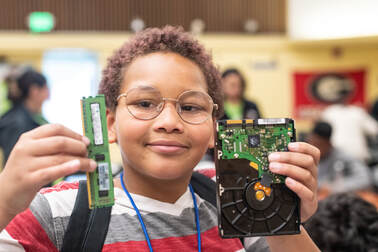 Tech Exchange, an organization that envisions a digitally connected Bay Area where everyone has the technology resources they need to thrive, announced today that it has been awarded a $20,000 grant from PayPal’s Tech for Good Program. The grant will be used to support Tech Exchange’s Tech for All solution – designed to supply everything needed to support digitally disconnected residents with technology access. Through the Tech for All solution, each household receives a free refurbished computer, digital skills resources, free tech support, and assistance accessing affordable $10/month Internet. “Digital access is still a barrier for far too many Bay Area residents.,” says Seth Hubbert, Executive Director of Tech Exchange. “Approximately 1.5 million Bay Area residents lack access to broadband and a home computer; we appreciate PayPal’s engagement and support to help close this inequitable divide.” Support for Tech for All was made possible through PayPal’s Tech for Good Program which launched in 2018 and leverages the funds the company receives for retired tech assets to benefit nonprofits and schools around the world. “Tech for Good helps us extend the positive impact we seek to have as a company and actively contribute to and strengthen communities around the world,” said Julie Vennewitz-Pierce, Director of PayPal Gives. “We’re proud to leverage the funds we receive from our retired technology to allow nonprofits and schools to invest in technology that will help advance their mission. The organizations that we are supporting through the Tech for Good program help build stronger, more inclusive communities that enable greater opportunity for individuals and families. Tech Exchange is a great example of this effort, and we’re pleased to support their work.” ABOUT TECH EXCHANGE Tech Exchange is driven to provide digital equity throughout the Bay Area by equipping underserved community members with affordable Internet connection, digital literacy skills, and refurbished computers coupled with free tech support. These digital inclusion services empower all individuals with the fundamental ability to access online education, employment, health care, financial services, and public resources as means with which to improve and enhance their lives. Over the last 25 years, Tech Exchange has distributed over 50,000 refurbished computers to underserved Bay Area community members, provided over 10,000 instructional hours of training, and offered 200 youth technical internships, all while diverting over 1,000 tons of e-waste from landfills. Currently, Tech Exchange serves over 4,000 households a year with digital inclusion services, with programming active in Alameda, Contra Costa, San Francisco, and Santa Clara counties. ABOUT PAYPAL GIVES Funded by corporate contributions, PayPal Gives is one of the ways PayPal steps forward to further our social impact objectives and actively support our communities across the globe. PayPal Gives supports and amplifies PayPal employees’ efforts to improve the neighborhoods in which they live and work through charitable giving, volunteering and fundraising. Photo ©2020 Hasain Rasheed Photography
Closing the digital divide for underprivileged communities is what we’re all about here at Tech Exchange. True economic empowerment for all will only be possible when equal access to technology is achieved, and we tackle this many different ways. In addition to our Tech for All services, we provide paid job training through internships, that are funded by an assortment of programs. As a result our interns are able to go on to employment with various tech-focused companies. Allow us to introduce you to one such intern, Aaron Chanthavong.  Currently, Aaron is Tech Exchange’s program coordinator, but he started out just like our other interns: refurbishing desktops and laptops, cleaning dirty monitors, wrapping endless feet of cable, and helping community members at weekend pop-up events. Over time, his drive and resourcefulness made him a natural hire for the organization. He initiated a social enterprise partnership between Tech Exchange and eBay that became our very first online revenue stream source. Not only are we bringing in about $10k in monthly revenue as a result, we are able to sell accessories and find use for excess gadgets that would otherwise had gone to e-waste. Additionally, Aaron oversees current interns, trains them on the eBay program, and provides tech support and distributes computers at our Tech Hub. In a nutshell, Aaron is the kind of success story that we’re proud to have a hand in making happen. He is especially exceptional, considering the path that brought him to our door. Coming from a background and family that could have benefitted from our Tech for All services, Aaron grew up without having access to a computer in the home. He enjoyed learning all he could in computer class in junior high, yet staying on after school to further enrich himself was not at option: because of how dangerous the neighborhood was, his mother mandated that he go directly home after the final bell. And as a result of a bad decision he made in the seventh grade, he fell in with the wrong crowd, was expelled, and resorted to illegal means of making money. However, the money that he made, he used on all the hardware he had missed out on as a child; gaming systems, laptops, phones, and more. After realizing that who he thought of as “friends” were anything but, he decided to enroll in a job training program with Civicorps (the program which also funded his internship). Ten months of education, coupled with our internship program, has granted Aaron a true career where he has the freedom of using his passion to enrich not only himself, but others in the community. This is what we strive to do, as we fulfill our mission of closing the digital divide through education and economic empowerment. Over the past several years, we’ve provided our interns with hands-on education in hardware, giving them real-world skills to troubleshoot, diagnose, repair, upgrade, and replace machines. Our interns are coached on providing service to the community, communicating with staff, and as a result, they leave our program not just primed for greater opportunity, but also for being an agent of change. When asked if he sees himself as an activist, Aaron replied: “I recently became an activist by supporting the underrepresented and community college students by finding different opportunities that can help bridge students and tech companies. It started after my English class in college, my instructor Professor Falco had really opened my mind up with the different topic she taught plus how compassionate she was towards students. She inspired me to do better for the communities I grew up in.” Tech Exchange as a company would be remiss if our focus on addressing economic empowerment and closing the digital divide were only through providing hardware and workshops. We’ve got to make sure that the underserved and underrepresented are able to be a part of the workforce of the future. We’ve got to start locally. We have grand plans on expanding our internship program so that we can expand our reach. Sign up for our newsletter and follow us on social media so that you’re part of the first to know about deadlines and updates. Photo credit: Chrystal Irene Picture this: it’s the second semester of your sophomore year in high school, and you’re sixteen years old. You live in a single parent household in a public housing project, who’s making just enough to keep a roof over everyone’s head and feed a family that includes two younger siblings. You work a part-time job during the week and weekends so that you can save money for college; literally every cent goes toward application fees, testing fees, and savings to minimize the amount in loans you know you’ll have to take out. No one in the family makes enough to be able to afford the initial fees of setting up home broadband and wifi - much less a monthly plan - and you can only afford a voice + text plan for your smartphone. This means that you only get internet when you have access to a wifi hotspot. You have a very important paper due tomorrow, and you still need to make revisions before submitting it online. By the time you get off work and rush to the city library, it will close in thirty minutes, and the closest coffee shop has a policy that you must buy something in order to sit and use their wifi. Their cheapest drink is outside of your carefully planned budget.
What do you do? It isn’t fair that anyone should be in the position to have to solve such a conundrum. In a true democracy, full economic, social, and political participation makes a citizen. It’s not out of pocket to say that a person without prompt and continuous access to the internet - in the year 2019 - is a person being denied access to their full citizenship. Unfortunately, this is the situation that millions of Americans find themselves in, including low-income Californians right here in our own backyard. One in four Bay Area residents lives in poverty, and access to technology and tech skills are key to providing a ladder out of that poverty. So here at Tech Exchange, we decided that we would do something about it. Our Tech For Housing program exists so that the situation as described above never happens again. We provide families living in low-income housing with digital literacy workshops that are taught in five different languages. Each workshop is tailored to the needs and priorities of participating residents, who range in experience from beginner to advanced. Upon completion of 8 hours of instruction, each household receives a free refurbished computer with a one year warranty, on-site tech support, and assistance with low cost internet access options. To date, we’ve provided over 25,000 hours of digital training instruction, and currently, we’re servicing 10 different public housing sites across the Bay Area. Families, veterans, seniors, working adults & students alike are closer to economic empowerment as a result of our direct action, and it is our intention to keep going. We’re closing the digital divide a little bit everyday, because internet access and digital literacy is a necessity, not a luxury. Our federal government is behind the curve when it comes to addressing the digital divide. In all honesty, you can count our voice as one of the many authorities pushing for the internet to be treated and regulated as a public utility. However, until that day comes, we will continue to rise to the challenge of bringing full access to information - and therefore full democratic participation - to public housing residents of the Bay Area. To learn more about Tech For Housing and our other programs and services, visit www.techexchange.org for more information. On social media, follow @techXorg on Twitter, Instagram, Facebook and visit our company LinkedIn page: www.linkedin.com/company/techxorg. |
Categories
All
Archives
July 2024
|



